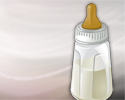How to save money on infant formula
The least expensive way to feed your baby is to breastfeed. There are many other breastfeeding benefits, too. But not all moms can breastfeed. Some moms feed their baby both breast milk and formula. Others switch to formula after breastfeeding for several months. Here are some ways you can save money on infant formula.
Here are a few ways to save money on infant formula:
- Do not buy just one type of baby bottle at first. Try a few different types to see which kind your baby likes and will use.
- Buy powdered formula. It is much less expensive than ready-to-use and liquid concentrate.
- Use cow's milk formula, unless your pediatrician says you shouldn't. Cow's milk formula is often less expensive than soy formula.
- Buy in bulk, you will save money. But first try the brand to make sure your baby likes it and can digest it.
- Comparison shop. Check to see which store is offering a deal or the lowest price.
- Save formula coupons and free samples, even if you plan to breastfeed. You may decide to supplement with formula a few months from now, and those coupons will save you money.
- Sign up for newsletters, special programs, and deals on formula company websites. They often send out coupons and free samples.
- Ask your pediatrician for samples.
- Consider generic or store-brand formulas. By law, they must meet the same nutritional and quality standards as brand-name formulas.
- Avoid using disposable bottles. You will have to use a different liner with each feeding, which costs more.
- If your baby needs special formula because of allergies or other health issues, see if your insurance will help cover the cost. Not all health plans offer this coverage, but some do.
What NOT to Do
Here are a few things to avoid:
- Do not make your own formula. There is no way to duplicate the same nutrition and quality at home. You could risk your baby's health.
- Do not feed your baby straight cow's milk or other animal milk before they are at least 1 year old.
- Do not reuse old plastic baby bottles. Reused or hand-me-down bottles may contain bisphenol-A (BPA). The Food and Drug Administration (FDA) has banned the use of BPA in baby bottles due to safety concerns.
- Do not switch brands of formula frequently. All formulas are slightly different and the baby may have digestive issues with one brand compared with another. Find one brand that works and stay with it if possible.
References
American Academy of Pediatrics website. Formula buying tips. www.healthychildren.org/English/ages-stages/baby/formula-feeding/Pages/Formula-Buying-Tips.aspx. Updated August 7, 2018. Accessed February 13, 2024.
American Academy of Pediatrics website. Forms of baby formula: powder, concentrate & ready-to-feed. www.healthychildren.org/English/ages-stages/baby/formula-feeding/Pages/Forms-of-Baby-Formula.aspx. Updated May 9, 2022. Accessed February 13, 2024.
American Academy of Pediatrics website. Nutrition. www.healthychildren.org/English/ages-stages/baby/feeding-nutrition/Pages/default.aspx. Accessed May 25,2023.
Parks EP, Shaikhkhalil A, Sainath NN, Mitchell JA, Brownell JN, Stallings VA. Feeding healthy infants, children, and adolescents. In: Kliegman RM, St. Geme JW, Blum NJ, Shah SS, Tasker RC, Wilson KM, eds. Nelson Textbook of Pediatrics. 21st ed. Philadelphia, PA: Elsevier; 2020:chap 56.
Review Date: 4/25/2023
Reviewed By: Charles I. Schwartz, MD, FAAP, Clinical Assistant Professor of Pediatrics, Perelman School of Medicine at the University of Pennsylvania, General Pediatrician at PennCare for Kids, Phoenixville, PA. Also reviewed by David C. Dugdale, MD, Medical Director, Brenda Conaway, Editorial Director, and the A.D.A.M. Editorial team.


